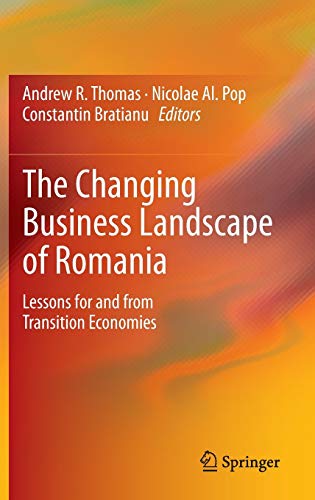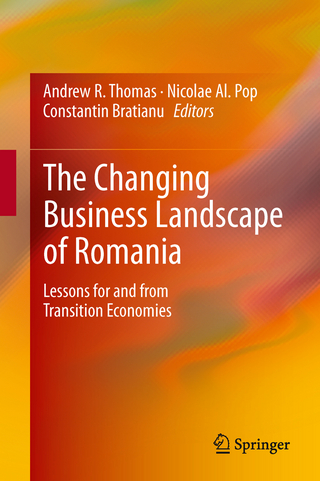
2013, ISBN: 9781461468646
Springer, Gebundene Ausgabe, Auflage: 2013, 312 Seiten, Publiziert: 2013-04-24T00:00:01Z, Produktgruppe: Buch, Hersteller-Nr.: 41 black & white tables, biography, 13.04 kg, Recht, Kategor… Altro …
| amazon.de Costi di spedizione:Die angegebenen Versandkosten können von den tatsächlichen Kosten abweichen. (EUR 3.00) Details... |

2013, ISBN: 1461468647
[EAN: 9781461468646], Neubuch, [PU: Springer New York], WIRTSCHAFTSPOLITIK WIRTSCHAFT VOLKSWIRTSCHAFT WIRTSCHAFTSPOLITIK, POLITISCHE ÖKONOMIE ECONOMIC POLICY ECONOMICS, Dieser Artikel ist… Altro …
| AbeBooks.de moluna, Greven, Germany [73551232] [Rating: 4 (von 5)] NEW BOOK. Costi di spedizione: EUR 21.36 Details... |

The Changing Business Landscape of Romania Lessons for and from Transition Economies - copertina rigida, flessible
2013, ISBN: 1461468647
2013 Gebundene Ausgabe Wirtschaftspolitik, mit Schutzumschlag 11, [PU:Springer New York; Springer US, New York, N.Y.]
| Achtung-Buecher.de MARZIES.de Buch- und Medienhandel, 14621 Schönwalde-Glien Costi di spedizione:Versandkostenfrei innerhalb der BRD. (EUR 0.00) Details... |

The Changing Business Landscape of Romania Lessons for and from Transition Economies - copertina rigida, flessible
2013, ISBN: 1461468647
[EAN: 9781461468646], Gebraucht, guter Zustand, [SC: 7.61], [PU: Springer US], Buchschnitt verkürzt- gepflegter, sauberer Zustand - Ausgabejahr 2013 23449251/12, Books
| ZVAB.com Buchpark, Trebbin, Germany [83435977] [Rating: 5 (von 5)] NOT NEW BOOK. Costi di spedizione: EUR 7.61 Details... |

2013, ISBN: 9781461468646
Lessons for and from Transition Economies, Buch, Hardcover, 2013 ed. [PU: Springer-Verlag New York Inc.], Springer-Verlag New York Inc., 2013
| lehmanns.de Costi di spedizione:Versand in 10-14 Tagen. (EUR 29.95) Details... |


The Changing Business Landscape of Romania: Lessons for and from Transition Economies - copertina rigida, flessible
2013, ISBN: 9781461468646
Springer, Gebundene Ausgabe, Auflage: 2013, 312 Seiten, Publiziert: 2013-04-24T00:00:01Z, Produktgruppe: Buch, Hersteller-Nr.: 41 black & white tables, biography, 13.04 kg, Recht, Kategor… Altro …

Thomas, Andrew R.|Pop, Nicolae Al.|Bratianu, Constantin:
The Changing Business Landscape of Romania - copertina rigida, flessible2013, ISBN: 1461468647
[EAN: 9781461468646], Neubuch, [PU: Springer New York], WIRTSCHAFTSPOLITIK WIRTSCHAFT VOLKSWIRTSCHAFT WIRTSCHAFTSPOLITIK, POLITISCHE ÖKONOMIE ECONOMIC POLICY ECONOMICS, Dieser Artikel ist… Altro …
The Changing Business Landscape of Romania Lessons for and from Transition Economies - copertina rigida, flessible
2013
ISBN: 1461468647
2013 Gebundene Ausgabe Wirtschaftspolitik, mit Schutzumschlag 11, [PU:Springer New York; Springer US, New York, N.Y.]

The Changing Business Landscape of Romania Lessons for and from Transition Economies - copertina rigida, flessible
2013, ISBN: 1461468647
[EAN: 9781461468646], Gebraucht, guter Zustand, [SC: 7.61], [PU: Springer US], Buchschnitt verkürzt- gepflegter, sauberer Zustand - Ausgabejahr 2013 23449251/12, Books

2013, ISBN: 9781461468646
Lessons for and from Transition Economies, Buch, Hardcover, 2013 ed. [PU: Springer-Verlag New York Inc.], Springer-Verlag New York Inc., 2013
Dati bibliografici del miglior libro corrispondente
| Autore: | |
| Titolo: | |
| ISBN: |
Romania stands at the crossroads of Europe, Asia, and the Middle East. Since 1990, when the country experienced the bloodiest revolution of all of the Warsaw Pact members, Romania has gone through withering change. While the formal transition from a totalitarian, communist state was completed in 2007 with Romania’s accession into the European Union, the adaptation of the nation’s people and business climate to a market-based economy is a daily occurrence.
In the 2000’s, in the lead up to EU accession, Romania was one of the largest recipients of Foreign Direct Investment in the world. While multinational corporations poured in hundreds of billions of dollars, there was also a restructuring of the way business was conducted. Western systems of management and organization―foreign to most Romanian academics and business people―almost overnight transformed the way the marketplace was perceived.
Romania’s entrepreneurs were quick to adapt to the new ways, leveraging new opportunities in the environment. Fortunes were made. Multinationals also burgeoned in Romania. Companies like Microsoft, General Electric, Timken, Kraft, P&G, Renault and dozens of others successfully took advantage of the possibilities created by a relatively well-educated population that was moving into the middle class.
For the most part, however, researchers and scholars were caught off guard by the quickening pace of business change in Romania. Only until very recently has the academic community at large been able to wade through the murkiness and begin to see what the new landscape looks like.
It is the purpose of this edited volume, which includes the work of some of Romania’s finest business scholars, to provide even greater clarity to the current and future scene. Moreover, the experience in Romania helps shed light on the dynamics of economic and business transition throughout Eastern Europe, the Middle East, and other emerging regions, with implications for practice, policymaking, and res
Informazioni dettagliate del libro - The Changing Business Landscape of Romania
EAN (ISBN-13): 9781461468646
ISBN (ISBN-10): 1461468647
Copertina rigida
Anno di pubblicazione: 2007
Editore: Springer-Verlag New York Inc.
442 Pagine
Peso: 0,606 kg
Lingua: Englisch
Libro nella banca dati dal 2008-04-03T22:21:34+02:00 (Zurich)
Pagina di dettaglio ultima modifica in 2024-01-27T21:01:27+01:00 (Zurich)
ISBN/EAN: 1461468647
ISBN - Stili di scrittura alternativi:
1-4614-6864-7, 978-1-4614-6864-6
Stili di scrittura alternativi e concetti di ricerca simili:
Autore del libro : andrews thomas, andré thomas, constant, bratianu, pop, leo constantin, nicol andrew, eastern crossroads, thomas kraft
Titolo del libro: romania, lessons landscape, business
Dati dell'editore
Autore: Andrew R. Thomas; Nicolae Al. Pop; Constantin Bratianu
Titolo: The Changing Business Landscape of Romania - Lessons for and from Transition Economies
Editore: Springer; Springer US
306 Pagine
Anno di pubblicazione: 2013-04-24
New York; NY; US
Stampato / Fatto in
Peso: 5,915 kg
Lingua: Inglese
106,99 € (DE)
109,99 € (AT)
118,00 CHF (CH)
POD
VI, 306 p.
BB; Economic Policy; Hardcover, Softcover / Wirtschaft/Volkswirtschaft; Wirtschaftspolitik, politische Ökonomie; Verstehen; Economic Policy; BC; EA
Romania stands at the crossroads of Europe, Asia, and the Middle East. Since 1990, when the country experienced the bloodiest revolution of all of the Warsaw Pact members, Romania has gone through withering change. While the formal transition from a totalitarian, communist state was completed in 2007 with Romania’s accession into the European Union, the adaptation of the nation’s people and business climate to a market-based economy is a daily occurrence.
In the 2000’s, in the lead up to EU accession, Romania was one of the largest recipients of Foreign Direct Investment in the world. While multinational corporations poured in hundreds of billions of dollars, there was also a restructuring of the way business was conducted. Western systems of management and organization—foreign to most Romanian academics and business people—almost overnight transformed the way the marketplace was perceived.
Romania’s entrepreneurs were quick to adapt to the new ways, leveraging new opportunities in the environment. Fortunes were made. Multinationals also burgeoned in Romania. Companies like Microsoft, General Electric, Timken, Kraft, P&G, Renault and dozens of others successfully took advantage of the possibilities created by a relatively well-educated population that was moving into the middle class.
For the most part, however, researchers and scholars were caught off guard by the quickening pace of business change in Romania. Only until very recently has the academic community at large been able to wade through the murkiness and begin to see what the new landscape looks like.
It is the purpose of this edited volume, which includes the work of some of Romania’s finest business scholars, to provide even greater clarity to the current and future scene. Moreover, the experience in Romania helps shed light on the dynamics of economic and business transition throughout Eastern Europe, the Middle East, and other emerging regions, with implications for practice, policymaking, and research.
Romania stands at the crossroads of Europe, Asia, and the Middle East. Since 1990, when the country experienced the bloodiest revolution of all of the Warsaw Pact members, Romania has gone through withering change. While the formal transition from a totalitarian, communist state was completed in 2007 with Romania’s accession into the European Union, the adaptation of the nation’s people and business climate to a market-based economy is a daily occurrence.
In the 2000’s, in the lead up to EU accession, Romania was one of the largest recipients of Foreign Direct Investment in the world. While multinational corporations poured in hundreds of billions of dollars, there was also a restructuring of the way business was conducted. Western systems of management and organization—foreign to most Romanian academics and business people—almost overnight transformed the way the marketplace was perceived.
Romania’s entrepreneurs were quick to adapt to the new ways, leveraging new opportunities in the environment. Fortunes were made. Multinationals also burgeoned in Romania. Companies like Microsoft, General Electric, Timken, Kraft, P&G, Renault and dozens of others successfully took advantage of the possibilities created by a relatively well-educated population that was moving into the middle class.
For the most part, however, researchers and scholars were caught off guard by the quickening pace of business change in Romania. Only until very recently has the academic community at large been able to wade through the murkiness and begin to see what the new landscape looks like.
It is the purpose of this edited volume, which includes the work of some of Romania’s finest business scholars, to provide even greater clarity to the current and future scene. Moreover, the experience in Romania helps shed light on the dynamics of economic and business transition throughout Eastern Europe, the Middle East, and other emerging regions, with implications for practice, policymaking, and research.
Altri libri che potrebbero essere simili a questo:
Ultimo libro simile:
9781461468653 The Changing Business Landscape of Romania (Andrew R. Thomas; Nicolae Al. Pop; Constantin Bratianu)
- 9781461468653 The Changing Business Landscape of Romania (Andrew R. Thomas; Nicolae Al. Pop; Constantin Bratianu)
- 9781493902071 The Changing Business Landscape of Romania (Andrew R. Thomas; Nicolae Al. Pop; Constantin Bratianu)
- The Changing Business Landscape of Romania - Lessons for and from Transition Economies (Andrew R. Thomas, Nicolae Al. Pop, Constantin Bratianu)
< Per archiviare...


